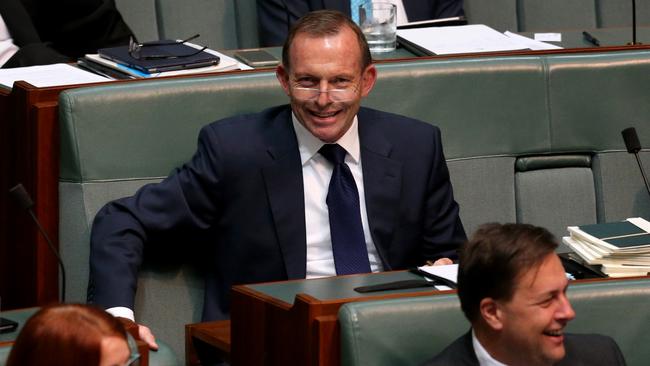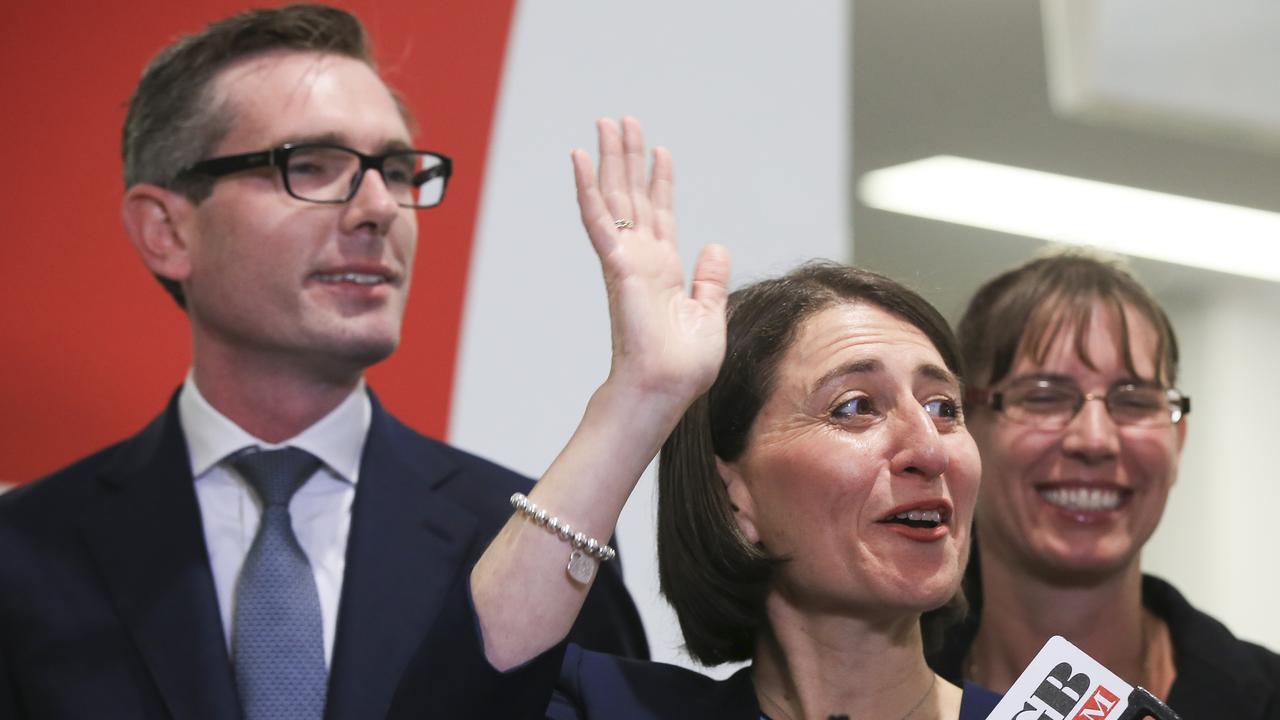
Our political/media class seems to have conveniently overlooked the most telling domestic lesson from the Trump ascendancy. Perhaps they worry it exposes their lack of judgment.
Donald Trump’s election triumph buttresses the argument that Tony Abbott’s overthrow was unnecessary — that he would have won this year’s election. It gives weight to the claim his poor midterm polling was meaningless and that his known strengths were electorally compelling.
Those of us who have long made this case believed that, for all his faults, Abbott’s strong positions on border protection, national security, climate caution, union corruption and budget discipline would contrast sharply with Labor. The political/media class, however, declared Abbott an embarrassment and barracked for a coup.
We will never know. But everything that has transpired since Abbott’s knifing tends to bolster the position: from the way Malcolm Turnbull has struggled to display certitude to how Bill Shorten hasn’t had to duck a punch; from the Prime Minister’s own polling and near defeat to Britain’s clear statement of faith in sovereignty through Brexit; and from Trump’s focus on borders and disdain for the dominant media narrative to his victory despite the polling consensus.
Some conservative Liberals and Nationals are still seething about all this and hope for a “Lazarus-with-a-triple-bypass” Abbott comeback. It is unlikely — besides, their sense of injustice tends to overlook the needless errors, self-inflicted wounds and unheeded warnings that saw Abbott engineer his own vulnerability to Turnbull’s understandable aspirations.
So this post-Trump observation is worth making not to stir enmities, settle grievances, delegitimise Turnbull or encourage a leadership rethink but, rather, to help identify the lessons Turnbull must heed to succeed.
It is another reminder that contrary to the urgings from the political/media class, Turnbull cannot afford to change the policy direction of the Coalition by softening important policies or drifting to the left. It reaffirms the warning not to believe his own publicity. On climate policy, borders and national security the sensible centre of politics wants the prescription already laid down by the centre-right Abbott government. Turnbull messes with that compact at his peril. There are encouraging signs he understands this: his new focus on energy security over renewable energy gestures; his strong words in New York on terrorism; and his push for a lifetime ban on unauthorised boat arrivals to help prevent his humanitarian US visa deal from undermining border security. Despite the Senate frustrations, fiscal restraint, budget repair and economic reform must remain top priorities.
Turnbull’s ability to pass his double-dissolution trigger bills and some modest budget reforms enable him to end the parliamentary year with baby steps of purpose — as foreshadowed in this column almost three months ago.
It also provides some vindication for his strategy. Many critics have mocked his double-dissolution strategy because it produced a menagerie of a Senate. This is disingenuous because no serious observer would have said the Coalition had any chance to win a Senate majority.
Turnbull’s Senate reforms, also planned under Abbott, are worthwhile and will eliminate accidental senators in the future. And, notwithstanding shambolic negotiations and side deals, the Coalition is getting some reform through the parliament.
Those who slam the double-dissolution strategy need to ask what Turnbull would have run on without it. He had a thin agenda, was out of time and was losing standing with every dawdling day.
Without this strategy built around the union accountability measures he would have limped through the budget to a predictable spring election, struggling to outline a cause. Instead, he seized the agenda, created a purpose for the election and managed — just — to hold on.
And now he has ushered the trigger bills through the Senate, along with a backpacker tax arrangement. With his team, he shows the adaptability to do deals with One Nation, Nick Xenophon, Derryn Hinch and others, as well as the Greens. The only immovable object (after some early savings co-operation) appears to be Labor.
Turnbull’s error this year was not his double-dissolution strategy but that he didn’t use it months earlier to capitalise on his honeymoon. Also, he ran a poor campaign. The Coalition failed to attack the Opposition Leader and failed to put the most pertinent questions into the daily campaign rhetoric — what was the risk of a return to Labor on border chaos, electricity prices, union behaviour and deeper deficits?
The reason all this is relevant now is that these questions remain palpable for Turnbull. Now that he has begun to display a modicum of governing ability, he must look to accentuate the choice between the Coalition and Labor’s alternative.
Again, thanks to its crack cocaine-like addiction to polls, the political/media class is writing off Turnbull. But, at the risk of repetition, the polls are almost meaningless right now.
Certainly, to become PM, Turnbull exploited the polls and, unwisely, even cited them. But he needs to recognise that conceit now (and hope everyone else does) while comprehending that what matters are policies, conviction and performance.
The most bankable quality for governments is competence. In difficult circumstances — and no doubt with more stuff-ups to come — Turnbull at least has started to claim some ground on this score.
Aside from more of this, he needs to work hard to appear in touch with voters: more interviews, more mainstream public events and more listening.
His budget strategy is vital; Scott Morrison must deliver fiscal restraint and economic reform significant enough to begin the repair task and satisfy ratings agencies, but moderate enough to pass the Senate. It won’t be easy but the welfare reforms being touted by Christian Porter and Alan Tudge provide fertile ground by embedding the mutual obligation and personal investment concepts that are working well in New Zealand.
This is a true centre-right approach and underpins long-term budget recovery.
Under Shorten, Labor has dug itself further in on the wrong side of crucial arguments. On climate policy, it offers a national 50 per cent renewable target that will escalate costs and undermine energy security. On border protection, it has a record of capitulation and mismanagement and it has abandoned its pretence of bipartisanship by rejecting temporary protection visas and the lifetime ban. On national security, Turnbull needs only to utter the words “Islamic extremism” to demonstrate he understands our current threat and smoke out an Opposition Leader unwilling to name our enemy. On union corruption, Labor appoints tainted unionists to the Senate and promises to abolish the Australian Building and Construction Commission for a second time. And on budget repair, Labor is committed to higher taxes and deeper deficits.
National politics and government are monumentally difficult any time, especially in the contemporary age of hyper-fascination, rampant demands and strained resources. But any right-of-centre government that cannot explain its rationale, embed its policies and win re-election against that Labor agenda has only itself to blame.






To join the conversation, please log in. Don't have an account? Register
Join the conversation, you are commenting as Logout